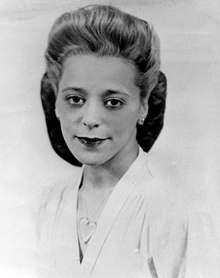Viola Desmond | |
|---|---|
 Desmond c. 1940 | |
| Born | July 6, 1914 Halifax, Nova Scotia, Canada |
| Died | February 7, 1965 (aged 50) New York City, U.S. |
| Resting place | Camp Hill Cemetery, Halifax |
| Occupation(s) | Business owner and beautician |
| Criminal status | Convicted (pardoned April 15, 2010)[1] |
| Spouse | Jack Desmond |
| Conviction(s) | Tax evasion under s. 8(8) of the Theatres, Cinematographs, and Amusements Act, R.S.N.S., 1923, c. 162[1] |
| Criminal penalty | Fine and court costs amounting to $26 (reversed by free pardon[2]) |
Date apprehended | November 8, 1946 |
Viola Irene Desmond (July 6, 1914 – February 7, 1965) was a Canadian civil and women's rights activist and businesswoman of Black Nova Scotian descent. In 1946, she challenged racial segregation at a cinema in New Glasgow, Nova Scotia, by refusing to leave a whites-only area of the Roseland Theatre. For this, she was convicted of a minor tax violation for the one-cent tax difference between the seat that she had paid for and the seat that she used, which was more expensive. Desmond's case is one of the most publicized incidents of racial discrimination in Canadian history and helped start the modern civil rights movement in Canada.[3]
In 2010, Viola Desmond was granted a posthumous free pardon, the first to be granted in Canada.[4][5] A free pardon deems the person granted the pardon to have never committed the offence and cancels any consequence resulting from the conviction, such as fines, prohibitions or forfeitures.[6] However, it was not until 2021 that the government repaid the $26 (worth $368 CAD as of 2021) fine to her estate in the form of a $1,000 scholarship that adjusted the amount to reflect the time value of money.[2] The Crown-in-Right-of-Nova Scotia also apologized for prosecuting her for tax evasion and acknowledged she was rightfully resisting racial discrimination.[7]
In late 2018, Desmond became the first Canadian-born woman to appear alone on a Canadian bank note—a $10 bill—which was unveiled by Finance Minister Bill Morneau and Bank of Canada Governor Stephen Poloz during a ceremony at the Halifax Central Library on March 8, 2018.[8][9] Desmond was also named a National Historic Person in 2018.[10]
- ^ a b "Grant of Free Pardon VIOLA IRENE DAVIS DESMOND" (PDF). Government of Nova Scotia. April 15, 2010. Retrieved August 15, 2022.
- ^ a b Cite error: The named reference
repaywas invoked but never defined (see the help page). - ^ Cape Breton University (November 21, 2019). "Viola Desmond Chair in Social Justice Brochure" (PDF).
- ^ Carlson, Kathryn Blaze (April 14, 2010). "'Canada's Rosa Parks,' Viola Desmond, posthumously pardoned". National Post. Archived from the original on April 18, 2010. Retrieved April 14, 2010.
- ^ "Late Viola Desmond Granted Apology, Free Pardon". NovaScotia, Canada. April 15, 2010. Archived from the original on May 2, 2014. Retrieved May 1, 2014.
- ^ "What are the different types of clemency?". Government of Canada. September 18, 2015.
- ^ "N.S. apologizes for 1946 conviction". Winnipeg Sun. April 15, 2010. Archived from the original on March 11, 2012. Retrieved April 17, 2010.
- ^ Harris, Kathleen (December 8, 2016). "Black rights activist Viola Desmond to be 1st Canadian woman on $10 bill". cbcnews.ca. Canadian Broadcasting Corporation. Archived from the original on December 8, 2016. Retrieved December 8, 2016.
- ^ Peter Goffin (December 8, 2016). "Civil rights pioneer Viola Desmond will appear on new Canadian $10 bill". Toronto Star. Archived from the original on December 8, 2016. Retrieved December 9, 2016.
- ^ Government of Canada Announces New National Historic Designations Archived January 19, 2019, at the Wayback Machine, Parks Canada press release, January 12, 2018.
